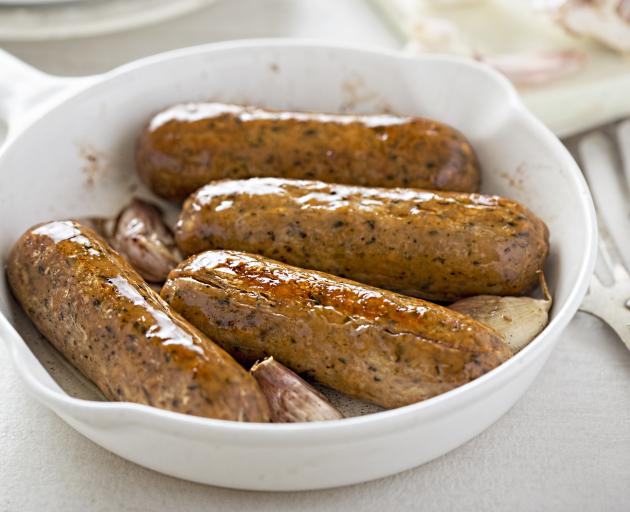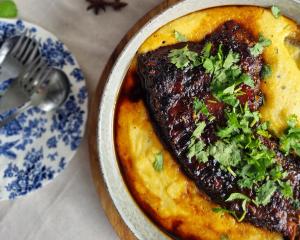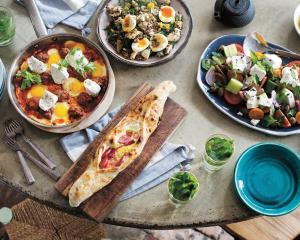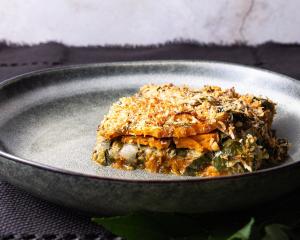
It was reported recently that Quorn is on course to become a billion-dollar business. It's part of a booming industry of meat alternatives, but many of these products are a far cry from the idea of a natural, plant-based diet, Joanna Blythman, of The Guardian discovers.
What exactly is Quorn? I have been asked that question regularly for more than 30 years.
This may be a reflection of the general population's scientific illiteracy, but most people remain hazy about the composition of Quorn - even those who eat it regularly.
However, many of us are prepared to accept this understanding gap because Quorn seems to be on the right side of the prevailing food paradigm, which holds that eating meat, fish, dairy and eggs is a redneck habit that has had its day, one that amounts to propagating cruelty and environmental ruin and will lead to dire consequences for human health.
On the other hand, "plant food'' - an appealing neologism for vegetarian and vegan that owes its intellectual heft to US food writer Michael Pollan's maxim "Eat food, not too much, mostly plants'' - is riding high on a wave of moral purity and an extravagant "feed the world and save the planet'' promise.
The short explanation is that Quorn is a "mycoprotein'' fermented in vats from a fungus found in soil. A fuller, but still heavily truncated, one is that it is made from a strain of the soil mould Fusarium venenatum by fermenting it, then adding glucose, fixed nitrogen, vitamins and minerals and heat-treating it to remove excess levels of ribonucleic acid. (In other words, it is a long way from what the phrase "plant food'' may seem to denote.)
Quorn's sales have steadily increased, but it was reported recently that they leapt globally by 16% last year, growth in Europe and the US running at 27% and 35% respectively. The company's bosses expect it to become a billion-dollar business by 2027.
It came to New Zealand in 2013.
The brand was launched in 1985 by Marlow Foods as a joint venture between the bakery giant Rank Hovis McDougall (since acquired by Premier Foods) and the chemical corporation ICI (now part of AkzoNobel). The search for artificial protein sources in the 1960s was prompted by fears that food supplies for humans would be rapidly exceeded by global population growth. Petroleum and chemical companies, including BP and ICI, funded projects to coax edible yeasts, moulds and bacterium to grow. A team from ICI eventually found F venenatum, but it was not until 1985 that the British government approved the sale of Quorn.
The company is now owned by the Philippine food conglomerate Monde Nissin, which includes other popular ultra-processed food brands in its portfolio.
Quorn has built up a range of more than 100 products, from mince and sausages to goat's cheese and cranberry escalopes and toad in the hole, and it is beefing up - excuse the pun - its vegan range.
Most Quorn products contain egg (free-range egg in the UK), but its vegan equivalents use potato protein instead. With artful use of additives and hi-tech ingredients in the food manufacturer's cabinet - factory flavourings and colourings, milk proteins, tapioca starch, palm oil, pea fibre, firming and gelling agents and so on - it seems that many of us will take chameleonic Quorn at face value as a dead ringer for everything from steak and bacon to gammon, chicken supreme and hot dogs.

Quorn has earned the patronage of the Olympian Mo Farah, the footballer Jermain Defoe and the broadcaster Ben Fogle. It gets a gastronomic thumbs-up from environmentalist and Guardian columnist George Monbiot, who says that "Quorn seems almost indistinguishable from chicken or mince to me''.
My impression could not be more different. While it is true that Quorn shows some of the bouncy, muscular resistance of lean meat, in every other respect - taste, smell, consistency, cooking properties, digestibility - it is nothing like meat. But I am an omnivore. To my knowledge, Quorn has never featured on the menu of any serious restaurant of note; it is more a supermarket midweek-meal proposition.
Although sales are shooting up in the US, Quorn got off to a poor start there, in 2002, when the American Mushroom Institute complained that fusarium was not a mushroom. Then it locked horns with the Centre For Science in the Public Interest.
This food-advocacy group has since collected more than 2000 "adverse reaction reports'' on Quorn from countries around the world, including New Zealand, and claims it has caused dangerous allergic reactions, nausea, vomiting, diarrhoea and occasionally hives and difficulty breathing. Quorn rejects this.
"We have sold about 4 billion Quorn products over 30 years and we know the safety record of the product is exceptional,'' CEO Kevin Brennan says. "Any form of reaction is exceptionally rare, perhaps one in 150,000.''
He says Quorn is "as benign as a potato''.
Although Quorn reached a class-action settlement agreement recently in California over whether it misled consumers who thought they were buying a mushroom-based product, it stresses that this settlement "does not acknowledge wrongdoing or liability in any way''.
It has since agreed to change the wording of its labels in the US to clarify the mould versus mushroom issue. They now read: "Mycoprotein is a mold [sic] (member of the fungi family). There have been rare cases of allergic reactions to products that contain mycoprotein.''
In the UK, Quorn packaging reads: "There have been rare cases of allergic reactions to Quorn products, which contain Mycoprotein. Mycoprotein is made with a member of the fungi/mould family. Mycoprotein is high in protein and fibre which may cause intolerance in some people.''
Despite these allergy concerns, there is an awful lot of money to be made from faking meat. But a couple of clouds on the horizon could yet upset Quorn's anticipated trajectory towards becoming a billion-dollar business.
While Marlow Foods maintains ownership of the brand name, the mycoprotein patents for the core technological process have expired in the EU. Any company can manufacture mycoprotein legally using the previously patented processes, providing they do not call it by the Q word.
While Quorn can claim with justification that it more or less invented fake meat, it must now contend with the technologically sophisticated faux meat rival concepts emerging in the US' Silicon Valley, the hub of the world's "plant meat'' gold rush.
One company, Beyond Meat, is bringing its eponymous plant burger to the UK this year. Its ingredients are pea protein isolate, expeller-pressed canola oil, refined coconut oil, water, yeast extract, maltodextrin, "natural'' flavourings, gum arabic, sunflower oil, salt, succinic acid, acetic acid, modified food starch, cellulose from bamboo, methylcellulose, potato starch, ascorbic acid, annatto extract, citrus fruit extract and glycerin. In addition, it contains beetroot juice extract to ape a meaty red colour. It is certainly not everyone's idea of "clean eating''.
The Impossible Burger has further upped the "no-death meat'' stakes. It stretches the limits of our scientific comprehension far beyond Quorn. The composition of this plant burger is in many respects similar to other meat lookalikes - water, protein powders, edible glues, factory flavourings, synthetic vitamins - but it is distinguished by its trailblazing use of soy leghemoglobin (SLH), a vat-grown, genetically engineered form of the heme iron found in the root nodules of soya bean plants.
Impossible Foods says this novel ingredient gives the Impossible Burger its "bloody'', meat-like taste and colour. The US Food and Drug Administration's view in August 2015 was that "the current arguments at hand, individually and collectively, were not enough to establish the safety of SLH for consumption''.
Nevertheless, since it was not explicitly ruled unsafe, the Impossible Burger is on sale in restaurants all over the US.
But the highly processed nature of Quorn and other plant "meats'' may yet be a stumbling block.
Quorn, in common with other fake meats, is incontestably ultra-processed. Evidently, this is not an issue for the animal welfare, vegetarian and vegan groups that hail such confections as a potential end to animal slaughter and the misery of factory farming.
But that proposition appeals less to those who prefer to base their meals on natural, minimally processed ingredients that they can easily recognise as food.
Public suspicion of ultra-processed foods with inscrutable ingredients, brought to us by Big Food Inc, is running high and more of us are up for eating only food that we truly understand.
That is a powerful sentiment with the potential to unite omnivore, vegetarian, and vegan alike.
- Guardian News and Media













